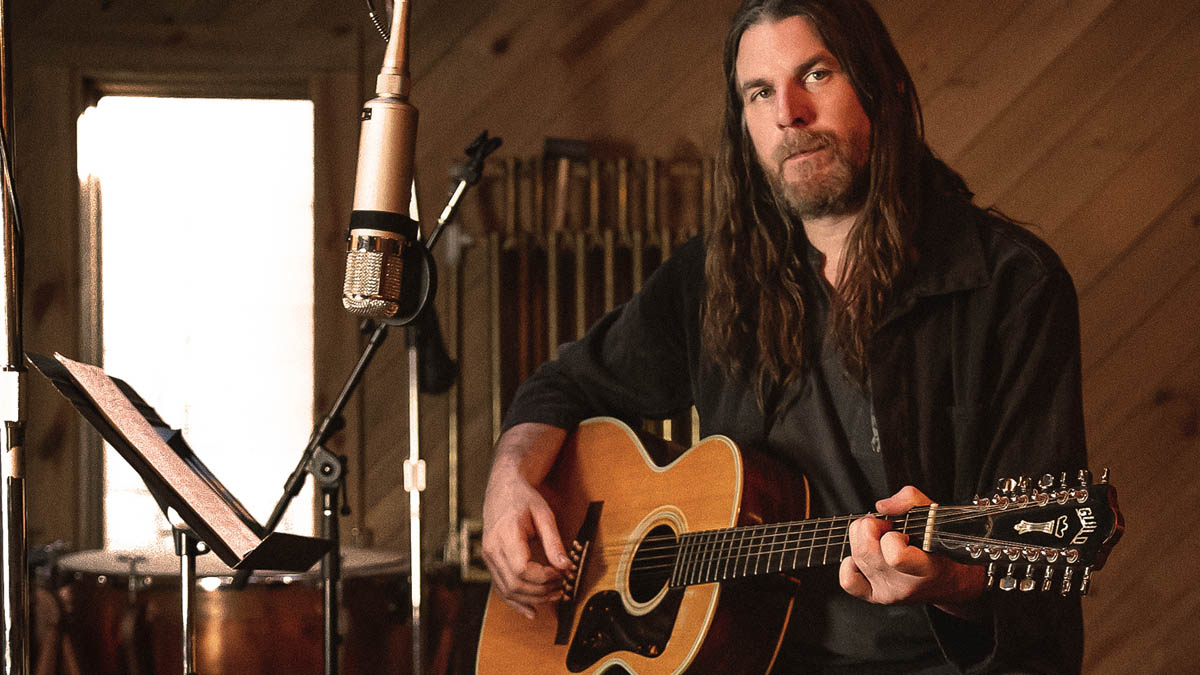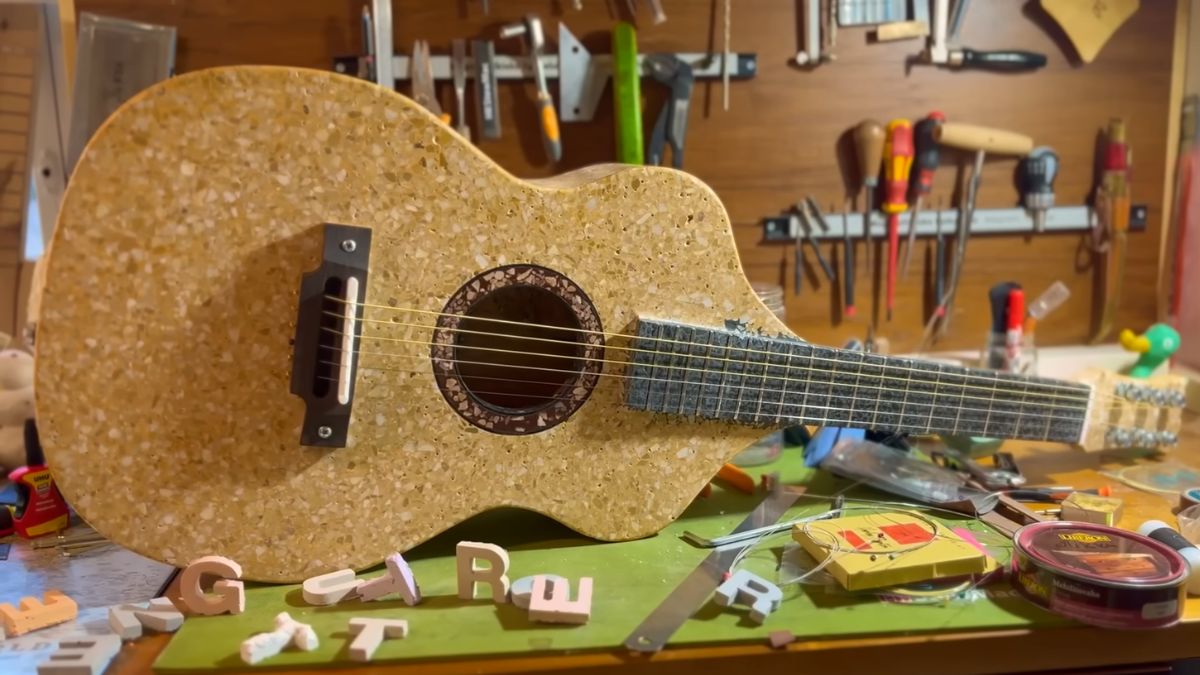“I was inspired to get away from the standard chordal structure we’ve all heard a thousand times”: Producer, luthier, songwriter like no other – Jonathan Wilson will take you on a strange trip
He toured with Roger Waters, produced Roy Harper and Father John Misty, and built electric guitars that became highly sought-after. Now, new album Eat the Worm finds the Laurel Canyon experimentalist messing around with song form, “f**ked up” Stratocasters and songs about Joe Bonamassa

Laurel Canyon-based Jonathan Wilson is an achiever, be it at making highly sought-after electric guitars (which he did for some years), touring with Roger Waters, producing work for the likes of Roy Harper and Father John Misty (among many others) or making his own broad, experimental and often thrilling records.
His latest, Eat The Worm, is partly a love letter to 1960s jazz, partly a beatnik poem about the decline of modern culture. Beguiling, baffling, beautiful, it is a cryptic mescaline dream of an album.
“It was at some point during the pandemic that I started some new songs,” Jonathan explains. “I had an album [Dixie Blur] that came out on 6 March 2020, which was a bit of a joke because it was when it all [the pandemic] started. And then during that period I started gathering some new songs and ideas, so it’s been a long process. But, then, there was no deadline and no hurry.”
Positive experimentation
Listening to the record, there is an almost playful quality to the songs, with fresh and adventurous arrangements but also an underlying sense of these songs having teeth, unsurprising considering the turmoil the world was facing at the time.
“I guess it’s a sort of statement on the state of affairs,” Jonathan nods. “But it’s also [a comment on] playing it safe in a standard song structure kind of way. It looks at opposing those standard tropes and the pitfalls of getting into them within the studio.”
Tropey this is not and the sound is happy to swell to euphoric from almost minimalist in places, like on the track Bonamossa, a Hunter S Thompson-esque warped reality (hence the misspelling), hallucinatory song, with the narrator hitting up a joint in Memphis: ‘Think I’ll play the blues like Bonamassa / nasty filthy sleaze / nasty filthy sleaze.’
Ironically, instead of guitars, the song is built on an odd drum machine beat and jaw harp, with sweeping strings and horns offsetting the weirdness.
Get The Pick Newsletter
All the latest guitar news, interviews, lessons, reviews, deals and more, direct to your inbox!
“Yeah, that’s a good thing,” he grins. “There is a bit of negativity in some of the observations on there, so I was careful to balance that; it’d be a drag to make an album basically saying, ‘It sucks now!’”
Going alone
Spending a lot of time in the studio as producer, Jonathan gets to tinker with sounds and tools a lot, which gave him a broad canvas in terms of what he wanted on his new album.
“I was inspired to stretch out and get away from the standard rhyme structure and chordal structure that we’ve all heard a thousand times,” he explains.
“But it’s also sort of a reaction to me being a bit baffled in the studio. I’ve been in there with some amazing fucking artists and I’ll say, ‘Hey, let’s try a crazy idea on the fretless bass, it’ll be like Sunset Grill by Don Henley,’ and someone would just say, ‘Er, I don’t think so.’ And I’ll think, ‘But you haven’t even heard it yet.’
“That’s the spirit of the thing, like the fuzz that starts off the Stones’ Satisfaction or something, which was wild at the time! Things like that happened, so this is like a response.”
Getting weird
Eat The Worm is, at its heart, an exploratory album and one that is unafraid to dive down sonic rabbit holes, a characteristic of Jonathan’s creative energy.
“To be honest, probably since 2010 I’ve been obsessed with Soft Machine and I listen to Robert [Wyatt]’s shit almost every day,” he smiles. “His blend of jazz and experimental weirdness, plus the fact that he plays drums like he does, or did, all that kind of stuff. That’s the channel I’m subscribed to at the moment.”
I have a huge appetite for jazz. But for this particular batch of songs I was listening to this band from Finland called Wigwam in the ’60s and ’70s
We wonder if this is where a lot of the strangeness of the new album stems from. “Well, yeah, and I have a huge appetite for jazz,” he answers. “But for this particular batch of songs I was listening to this band from Finland called Wigwam in the ’60s and ’70s.
“Jim Pembroke [from the band] died during the process of this album [in late 2021] and somebody showed me a video of him, which I saw and thought was fantastic! So I found this album Jim did in 1972 or something with, like, 6,000 strings and it’s like Frank Zappa meets Beefheart meets a high school talent show. It’s so good, so fucking weird – and it got me going.”
All of this being said, there are moments of intimacy across Eat The Worm, like a particularly beautiful and subtle guitar string buzz on Lo And Behold that brings the listener back to Earth.
“The archetype of that song was about my friend Roy Harper,” Jonathan says. “I was thinking about the vibe of his stuff and some of the gigs I had done with him and the string arranger David Bedford. So it has that feel and the vibe of those albums where it was just Roy and basically strings and horns.”
The other craft
Going back to the early 2000s, Jonathan decided to veer off into a new direction within the music industry and start building high-end electric guitars.
“It was me trying to get out of the business of bands and companies,” he admits. “I was a bit like, ‘Fuck the music business’ at the time and I was on the outskirts and built guitars from 2004 until 2011.”
While Jonathan is quite modest on the subject, his guitars were sought-after instruments and highly regarded.
“They were fucking expensive!” he laughs. “What I was doing was like a better version of the aged relic stuff. [Fender] had done an aged Broadcaster for Keith [Richards] and at the time I was sharing a studio and it had a ’57 Telecaster in and it was incredible.
“When the guitar went back, I set a goal to build one exactly like it, from the neck to the finish and weight. I had seen the Custom Shop stuff and it didn’t look great, but the idea was there and I thought it was cool and it could be done. So I worked on it for a long time and basically got it down. It was fun.”
Tools & treasures
When it comes to how Jonathan considers guitars in his own music, his practical, productive thinking comes through strongly.
“Nowadays, they’re objects for higher midrange [music] for me,” he says. “I’m also a big fan of that aggression and fuzz and the high-end scrunkiness that they have. I haven’t been as much into long guitar solos and stuff like that on this album, but they’re so complex in the midrange that they’re great to have around.”
As for the instruments themselves, Jonathan is not particularly precious as their owner, but there is still plenty of respect there. “If I have a session to go to in town, then I’ll put six guitars in the car without cases and if they bang around it’s okay. So I guess that would mean that they’re tools.”
He jumps up a moment to grab a pretty beat-up looking guitar. “This is my main Stratocaster and it’s all fucked up; it’s horrible! So this is a tool, but it’s the main one – it’s just a partscaster that my dad actually made in 2004. This thing has done a lot of gigging…”
This is a 1947 000 Martin... head and shoulders above the rest. These things are just so great
When we mention acoustic guitars, the impression is had that they are handled less roughly than the electrics.
“I have a ton of them and most of the best ones are very old, like from the ’40s,” Jonathan says. “That was the golden time for Gibson and for Martin.” He springs up again and goes to another room to grab an example.
“So this is a 1947 000 Martin,” he tells us, flashing a beautiful 18 series model. “This is head and shoulders above the rest. These things are just so great. They all have a certain sound, but this is like [gesture of reverence]...”
We suggest that he wouldn’t let the old Martin bounce around in the back of a car. “Oh no,” he laughs. “Not that one.”
- Eat the Worm is out now via BMG.
Glenn Kimpton is a freelance writer based in the west of England. His interest in English folk music came through players like Chris Wood and Martin Carthy, who also steered him towards alternate guitar tunings. From there, the solo acoustic instrumental genre, sometimes called American Primitive, became more important, with guitarists like Jack Rose, Glenn Jones and Robbie Basho eventually giving way to more contemporary players like William Tyler and Nick Jonah Davis. Most recently, Glenn has focused on a more improvised and experimental side to solo acoustic playing, both through his writing and his own music, with players like Bill Orcutt and Tashi Dorji being particularly significant.
“There’d been three-minute solos, which were just ridiculous – and knackering to play live!” Stoner-doom merchants Sergeant Thunderhoof may have toned down the self-indulgence, but their 10-minute epics still get medieval on your eardrums
“There’s a slight latency in there. You can’t be super-accurate”: Yngwie Malmsteen names the guitar picks that don’t work for shred

![A black-and-white action shot of Sergeant Thunderhoof perform live: [from left] Mark Sayer, Dan Flitcroft, Jim Camp and Josh Gallop](https://cdn.mos.cms.futurecdn.net/am3UhJbsxAE239XRRZ8zC8.jpg)









